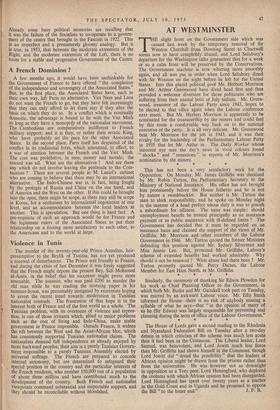No Centre in Italy
The coalition that has governed Italy for seven years is dead. When its constituent parties failed to secure the necessary majority in the recent elections, it was generally recognised that it had received a serious blow. But it was assumed that the coalition would either resume office with a minority in the Chamber or that it ,would broaden its base to the right or to the left. But what has actually happened is that the coalition itself has splintered under the impact of its electoral failure. The Social Democrats have announced that the Christian Democrats (Signor de Gasperi's party) have ignored the lesson of that failure by refusing to adopt a social policy whfch was directed more to the working than to the middle classes. The Liberals and the Republicans are also withholding their full support for Italy's veteran Prime Minister. Signor de Gasperi's attempts to broaden the coalition, which were never particu- larly promising, are faring, no better. The Nenni Socialists will not abandon their neutralist foreign policy; and the Monarchists, who have been angling for office, have made it clear that they would only accept a Christian Democrat Prime Minister who was further to the right than Signor de Gasperi. Already some busy political memories are recalling that it was the failure of the Socialists to co-operate in a govern- ment of the centre that brought in the Fascists in 1922. This is an imperfect and a prematurely gloomy analogy. But it is true, in 1953, that between the moderate extremists of the Right, and the moderate extremists of the Left, there is no room for a stable and progressive Government of the Centre.



































 Previous page
Previous page